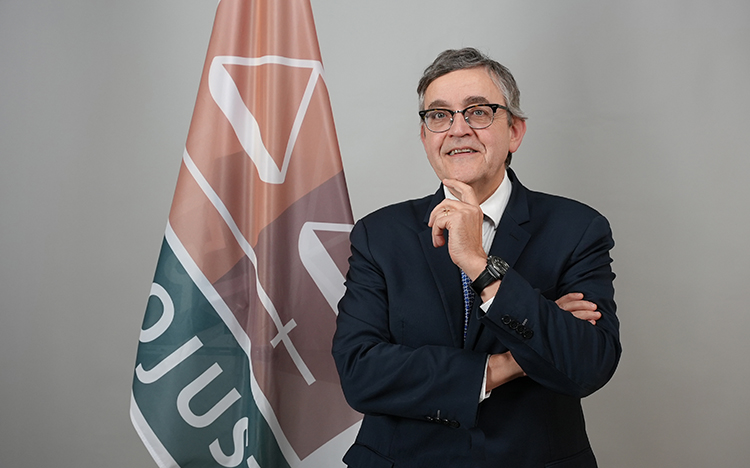
The French Desk is headed by Baudoin Thouvenot, who is the National Member for France since September 2019.
In 2025, the French Desk was involved in 959 new cases, 201 coordination meetings, 5 coordination centres and 86 joint investigation teams.

The French Desk is headed by Baudoin Thouvenot, who is the National Member for France since September 2019.
In 2025, the French Desk was involved in 959 new cases, 201 coordination meetings, 5 coordination centres and 86 joint investigation teams.

Baudoin Thouvenot was appointed National Member for France in September 2019. Mr Thouvenot is a career investigative judge. He was 12 years old when he made up his mind about his future professional path and never changed it since then. His first appointment as an investigative judge was with the Court of Dunkirk in 1991, followed by several posts in the jurisdictions of the Court of Paris, where his last appointment was as Dean of the investigative judges of the Court of Paris. During his 15-year tenure as an investigative judge for the Court of Paris, Mr Thouvenot spent 10 years as a judge for the JIRS of Paris (interregional specialised jurisdiction, dealing with organised crime), and started visiting Eurojust at its previous headquarters in Voorburg, the Netherlands. Mr Thouvenot took part in a coordination meeting at Eurojust for the first time in 2003, and came back on several times. He became a convinced ‘client’ of Eurojust over the years, frequently satisfied with what could be achieved in a case after a one-day coordination meeting. For him, ‘Eurojust is a practical and efficient means for judicial cooperation’.
In 2006, he took part in a triptych documentary film project on ‘Judicial Europe’ and suggested using a case he was working on, which involved the trafficking in human beings for sexual purposes, as an example of judicial cooperation in action. Mr Thouvenot was one of the magistrates filmed during the different phases of the case involving five Member States. This first part, ‘Escort’, was released in 2010, and the second part of the documentary project, ‘Marriages for sale’, in 2014. This project’s third film will be released in 2020. The filmmaker, Olivier Ballande, lauded Mr Thouvenot’s involvement, saying that ‘without him, we couldn’t have made these films’.
Mr Thouvenot sees his mandate as French National Member at Eurojust as a logical completion of his career. He is eager to enrich himself with the knowledge of the different judicial systems and firmly believes that when it comes to judicial cooperation there are no ‘small countries’, but rather magistrates fighting crime across borders. He is looking forward to working closely with all his colleagues and promoting a strong European spirit in the College.
Nicolas Le Bris graduated from the National School of Magistrates in 2008 and has been a public prosecutor since then. Until 2011, he was appointed to different courts in the jurisdiction of the Court of Appeal of Rennes, before moving to the Court of Paris, still as a public prosecutor.
In 2014, Mr Le Bris joined the Counter Terrorism Unit of the Public Prosecutor’s Office in Paris. In this capacity, he was the prosecutor on call in the night of 13 November 2015, as the Paris terror attacks were unfolding. He has been building the case against the terrorists and prosecuted the perpetrators during the trial that lasted from 8 September 2021 until the verdict was issued on 29 June 2022.
In the context of the Paris terror attacks, Mr Le Bris discovered Eurojust by participating in several coordination meetings and a joint investigation team, where he could witness how the involvement of the Agency lead to tangible progress in crucial issues in the case. He says about Eurojust that its main strength is ‘to gather people around the table who otherwise wouldn’t communicate directly’.
Sophie Gschwind is Assistant to the National Member since September 2024.
Jonathan Roz is Assistant to the National Member.
Morgan Martin is Assistant to the National Member.
What strikes you most about working at Eurojust?
I am impressed by the quality of cooperation among the different National Desk members on cases. We manage to work together, despite the differences in our cultural and legal systems, and find the best practical and judicial solutions to support our respective authorities.
Could you describe a case that you have supported and which had a particularly successful outcome?
For a major case of fraud, we organised an action day and coordination centre on 9 January 2020 at Eurojust, involving seven countries and two French jurisdictions. The ability between Eurojust colleagues to react quickly and efficiently to the needs of the authorities in the field was impressive. The outcome of the operation was particularly successful as the organised crime group’s actions and crime proceeds were evaluated to be worth several billion euros. On a more personal level, I found myself in a position, as a National Member, to issue an European Investigation Order, in agreement with the investigative judge in charge of the case (who was involved in one of the field operations), as it is in my power as stated in the French Penal Proceeding Code.
Which of the services and tools available through Eurojust do you consider most important for national judicial authorities – and why?
Coordination meetings and coordination centres (the latter being a French concept developed by Nicolas Chareyre, previous Deputy National Member of the French Desk) allow us to sit at the table and discuss how to cooperate in a case and always find the best solution, or at least a solution that is suitable for all parties, in a timely manner but also in cases of emergency. The service of the interpreters that Eurojust offers during the coordination meetings is absolutely crucial for the discussion process to succeed. I also believe that the excellent relationships the Desk members are able to build by being together in the Eurojust building, in a respectful and kind atmosphere, is an invaluable asset in the support Eurojust provides to national authorities.
2019 | 2020 | 2021 | 2022 | 2023 | 2024 | 2025 | |
|---|---|---|---|---|---|---|---|
New cases (total) | 633 | 717 | 1025 | 1281 | 1366 | 1063 | 959 |
Coordination meetings (initiating and/or participating) | 137 | 87 | 129 | 128 | 161 | 196 | 201 |
Coordination centres (organising and/or participating) | 7 | 8 | 6 | 6 | 6 | 14 | 5 |
Joint investigation teams (newly signed and/or ongoing) | 52 | 55 | 51 | 43 | 54 | 66 | 86 |
Crime: Several criminal organisations, belonging to one of the most dangerous high-risk criminal networks in the European Union, work together to carry out large-scale poly-criminal activities (including drug trafficking and money laundering) in and outside the European Union.

Action: On 22 November, 94 searches are executed across Europe, targeting the leaders of the criminal organisations and their associates. In an unprecedented international operation, involving judicial and law enforcement authorities from 11 countries, 44 individuals are arrested in Lithuania, the Czech Republic, Latvia, France, Germany, Poland, Norway, Slovakia, Spain and the United States.
Result: During the action day, large quantities of various illicit drugs, such as cocaine, hashish and cannabis and methamphetamine are seized.
Eurojust's role: International cooperation coordinated by Eurojust and Europol is key to bringing the perpetrators located in different locations across the world to justice. Eurojust sets up and finances two JITs, which, together with Europol’s Operational Taskforce, serve as a joint hub for criminal intelligence. Based on this pool of information and evidence, the different authorities agree on a common strategy to bring down the whole network. Eurojust organises 15 coordination meetings to prepare for the action day and sets up a coordination centre to provide cross-border judicial assistance.

Crime: A criminal network is suspected of using small boats to smuggle up to 10 000 migrants across the English Channel. The suspects charge EUR 2 500 to 3 500 on average per migrant, depending on the migrant’s nationality, to facilitate their transfer across the English Channel. At times, up to 15 boats are launched simultaneously, with only half successfully making it across to the United Kingdom.
Action: During an action day, involving over 900 police officers, 39 suspects are arrested and over 50 locations are searched in what is believed to be the largest ever international operation targeting small boat people smugglers.
Result: Supported by Eurojust and Europol, judicial and law enforcement authorities in France, Germany, Belgium, the Netherlands and the United Kingdom successfully dismantle the criminal network of people smugglers. Seizures include 1 200 lifejackets, close to 150 boats and 50 engines, several thousand euros in cash, firearms and drugs.
Eurojust's role: Four coordination meetings are hosted by the Agency to facilitate judicial cooperation and the preparation of the joint action day. A coordination centre is set up by Eurojust to enable rapid cooperation between the concerned judicial authorities during the action day.

19 March 2022 - The former Argentinian rugby professional, Federico Martín Aramburú, who played for his national squad as well as several top-division teams in Scotland and France, is fatally wounded during a shooting in Paris.
22 March 2022 - The suspect, who had fled to Hungary heading for Ukraine, is held by the border police following a search warrant from French law enforcement authorities.
23 March 2022 - Via on-call coordination during the night, the French and Hungarian desks at Eurojust rapidly transmit the EAW issued by the judicial authorities in Paris in just a few hours, before the end of the legal preventive custody. Thanks to this overnight support from Eurojust, the alleged suspect of the murder is arrested in Hungary in the morning.
25 March 2022 - The Hungarian judge surrenders the suspect to the French authorities.
